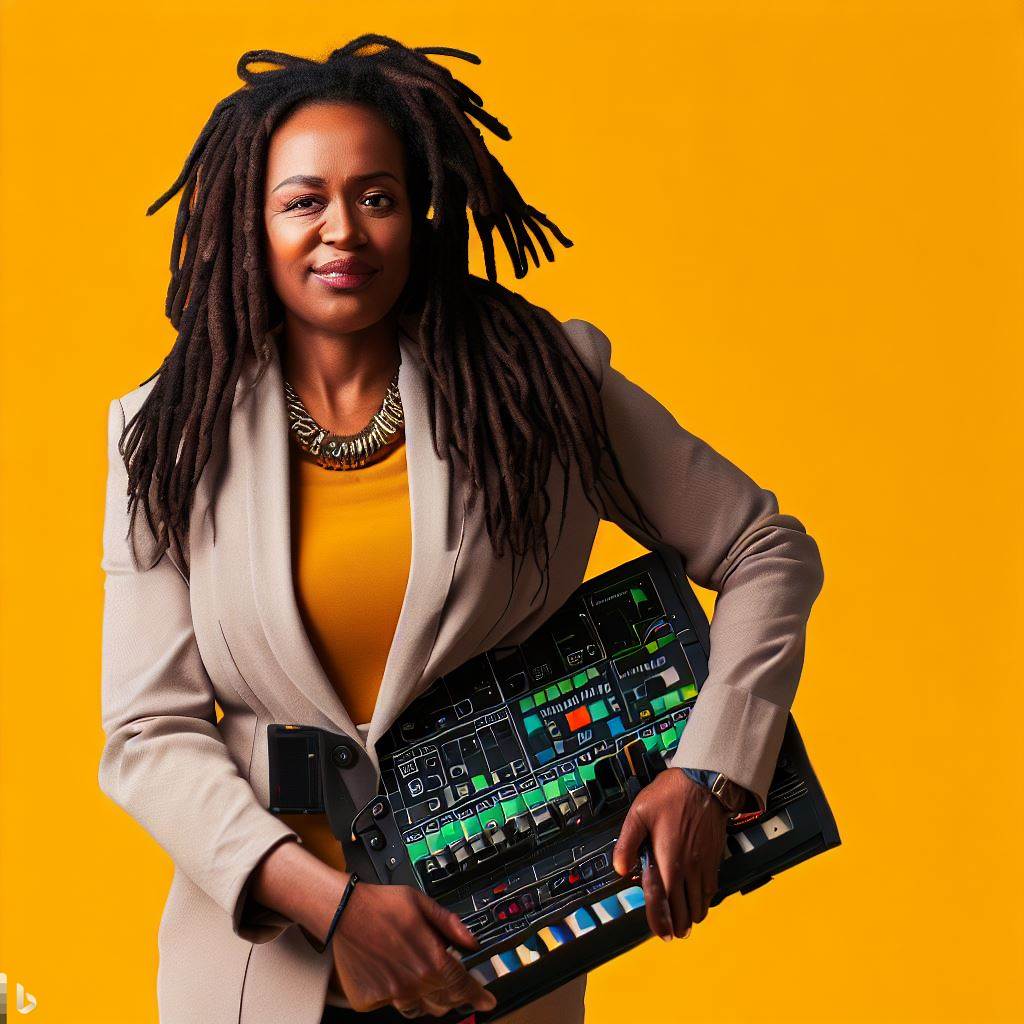Introduction
The Role And Importance Of A Music Director In The Nigerian Music Industry
Nigerian Music directors Skills are necessary for a successful career.
In the Nigerian music industry, a music director plays a crucial role in creating and shaping the artistic vision of a musical production.
They are responsible for coordinating and directing the musical elements, ensuring the overall quality of the music.
The Key Skills Every Nigerian Music Director Should Possess
The purpose of this blog post is to highlight the key skills that every Nigerian music director should possess.
These skills are essential for their success in the industry and for effectively bringing out the best in the artists and the music they create.
- Technical Proficiency: A music director should have a deep understanding of music theory, composition, and various music styles.
- Leadership: They must possess strong leadership skills to effectively guide and inspire musicians and vocalists.
- Communication: Good communication skills are essential for effective collaboration with artists, production managers, and other industry professionals.
- Adaptability: Music directors should be flexible and able to adapt to different musical genres and working environments.
- Creativity: They should have a creative mindset to bring fresh ideas and innovation to musical arrangements.
- Attention to Detail: Paying attention to minor nuances and details in music is crucial for delivering a high-quality production.
- Time Management: A music director should be skilled in managing time effectively and meeting project deadlines.
- Emotional Intelligence: Understanding and empathizing with artists and their emotions is necessary for bringing out the best in their performances.
- Problem-solving: Being able to quickly identify and solve technical and creative challenges is essential.
- Networking: Building relationships with industry professionals can open up opportunities for collaborations and future projects.
In the industry, a Nigerian music director’s pivotal role demands skills like technical expertise, leadership, adaptability, creativity, and networking for success.
Musical Expertise
- The importance of being well-versed in music theory cannot be overstated.
- Knowledge of different genres, styles, and trends allows a music director to adapt to various projects.
- A strong understanding of musical instruments and their capabilities is crucial for effective music direction.
- Having a keen ear for harmony, melody, and rhythm is essential to creating cohesive and captivating musical arrangements.
The Importance of Music Theory
Music theory serves as the foundation for any music director’s expertise.
It provides a framework for understanding the structure, composition, and performance of music.
By studying music theory, directors are able to communicate effectively with musicians, composers, and other professionals involved in the music production process.
Furthermore, a deep understanding of music theory allows directors to experiment with different genres, styles, and trends.
This flexibility is key in the dynamic Nigerian music industry, where artists often blend various elements to create unique and boundary-pushing sounds.
Understanding Instruments and Their Capabilities
A music director must possess a strong knowledge of musical instruments and their capabilities to guide musicians effectively.
This expertise allows them to make informed decisions regarding instrument selection, arrangement, and performance techniques.
By understanding the unique characteristics of each instrument, a music director can create harmonious arrangements that highlight the strengths of individual musicians.
This knowledge also enables directors to push the boundaries of traditional instrument usage, resulting in innovative and captivating compositions.
The Significance of a Keen Ear
A keen ear for harmony, melody, and rhythm is essential for a music director to create cohesive and impactful musical arrangements.
This skill allows directors to identify and correct any potential musical discrepancies or issues that may arise during rehearsals or performances.
Additionally, a keen ear helps music directors bring out the best in vocalists and instrumentalists, ensuring their performances are in sync and highlighting the emotional essence of the music.
This attention to detail enhances audience engagement and elevates the overall quality of the musical production.
Having strong musical expertise is essential for Nigerian music directors. A deep understanding of music theory, genres, styles, and trends allows directors to adapt to various projects.
Knowledge of instruments and their capabilities enhances a music director’s ability to guide musicians effectively and create innovative compositions.
A keen ear for harmony, melody, and rhythm ensures the cohesiveness and quality of musical arrangements.
Nigerian music directors, through constant skill refinement, flourish in the evolving industry, enhancing the global success and growth of Nigerian music.
Read: Advancements in the Field of Interpretation in Nigeria
Leadership and Communication Skills
A music director has a crucial role as a leader in the Nigerian music industry.
Possessing strong leadership skills is essential to effectively guide and direct the musicians, producers, and artists involved in a music project.
Effective communication is a vital skill for collaboration with musicians, producers, and artists.
It enables the music director to convey their vision and ideas clearly, ensuring everyone is on the same page.
Clear instructions play a significant role in enhancing performance.
A music director should be able to articulate their expectations and provide guidance to the team.
Constructive feedback is essential for growth and improvement.
A music director should be skilled at providing feedback that is helpful and supportive, encouraging the performers to excel.
Leadership Skills
- Visionary: A music director should have a clear vision and inspire others to work towards it.
- Decisiveness: Making prompt decisions is crucial in the fast-paced music industry.
- Adaptability: A music director must be flexible and able to adapt to evolving situations.
- Confidence: Confidence inspires trust and motivates the team to perform at their best.
- Team Building: Building a cohesive team fosters collaboration and creativity.
- Problem-solving: Effective problem-solving skills ensure smooth operations during music projects.
Communication Skills
- Active Listening: Listening attentively to others’ ideas and concerns promotes effective communication.
- Clarity: Using clear and concise language helps avoid misunderstanding and confusion.
- Empathy: Understanding and empathizing with musicians and artists create strong connections.
- Non-Verbal Communication: Being aware of body language and facial expressions enhances communication.
- Collaboration: Encouraging open and collaborative communication fosters a positive work environment.
- Professionalism: Maintaining professionalism in all communications builds credibility and respect.
Instruction and Feedback
- Clarity: Giving clear instructions ensures everyone understands what is expected of them.
- Precision: Being specific with feedback helps musicians improve their skills and performances.
- Tactfulness: Delivering feedback with tact and sensitivity encourages growth without discouragement.
- Constructive: Providing constructive feedback focuses on areas for improvement while acknowledging strengths.
- Timeliness: Giving feedback promptly ensures that necessary adjustments can be made in a timely manner.
- Encouragement: Balancing feedback with encouragement motivates musicians to strive for excellence.
Music directors in Nigeria hold a position of significant responsibility.
Possessing strong leadership and communication skills is essential for success in this role.
By effectively leading and communicating, music directors can inspire their teams, enhance performances, and create exceptional musical experiences.
Read: Spotlight: Nigerian Interpreters Making a Global Impact

Creativity and Innovation
The Importance of Creativity in Music Direction
- Creativity is crucial for music directors as it allows them to bring fresh ideas to the table.
- Proficiency in creating unique arrangements and compositions sets a music director apart from others.
- Being creative helps in exploring different musical styles and genres to cater to diverse audiences.
- It allows music directors to experiment and push boundaries, resulting in innovative and exciting performances.
- With creativity, a music director can elevate a simple piece of music to something extraordinary.
The Ability to Think Outside the Box and Adapt to New Music Trends
- Thinking outside the box enables music directors to break away from conventions and create fresh sounds.
- Adapting to new and emerging music trends helps music directors stay relevant in a constantly evolving industry.
- By embracing new trends, directors can attract a wider audience and connect with younger generations.
- They can blend traditional and contemporary elements to create a unique and appealing musical experience.
- Being open to change and innovation allows music directors to stay ahead of the competition.
Innovative Approaches to Creating Memorable Performances and Experiences
- Music directors need to constantly find innovative ways to captivate and engage their audience.
- They can create memorable performances by incorporating visual elements, such as stage design and lighting.
- Using technology, such as live audio-visual effects, can enhance the overall experience for the audience.
- Collaborating with other artists and musicians can lead to unique and unforgettable performances.
- Music directors can experiment with interactive elements, such as audience participation, to create a lasting impact.
Creativity and innovation are essential skills for Nigerian music directors.
Being able to think outside the box, adapt to new music trends, and take innovative approaches to performances can set them apart in the industry.
By embracing these skills, music directors can create unique and memorable experiences for their audiences, contributing to the growth and development of Nigerian music.
Read: Certification and Licensing for Translators in Nigeria
Technical Proficiency
In addition to the creative and leadership skills required, music directors in Nigeria must also possess a solid understanding of music production software and equipment.
This technical proficiency is crucial for success in the industry.
1. Understanding of Music Production Software and Equipment
- Music directors should be well-versed in popular digital audio workstations (DAWs) such as Ableton Live, FL Studio, or Logic Pro.
- A strong knowledge of MIDI controllers, synthesizers, and drum machines is essential for creating unique sounds and textures in music production.
- An understanding of audio interfaces, microphones, and studio monitors is necessary to achieve high-quality recordings.
2. Importance of Technical Skills in Recording, Editing, and Mixing Music
- A music director’s technical skills directly impact the overall sound and production quality of a song or album.
- Proficiency in recording techniques ensures that the performances are captured accurately and with minimal noise or distortion.
- Effective editing skills allow for seamless transitions, precise timing, and the elimination of any unwanted elements in the music.
- Mixing expertise enables music directors to balance the levels and panning of individual tracks, create depth, and achieve a polished final product.
3. Navigating Digital Platforms and Social Media
- In the modern music industry, it is crucial for music directors to be proficient in navigating digital platforms and social media.
- They should have a deep understanding of streaming platforms like Spotify, Apple Music, and YouTube, and be able to effectively distribute music on these platforms.
- Being skilled in social media management enables music directors to engage with fans, promote their work, and build a strong online presence.
- Knowledge of digital marketing strategies, such as targeted advertising and influencer collaborations, can significantly impact the success and visibility of an artist’s music.
Essentially, technical proficiency is a vital skill set that every Nigerian music director must possess.
It encompasses a solid understanding of music production software and equipment, as well as the ability to navigate digital platforms and social media for promotion and engagement.
By honing their technical skills, music directors can ensure the highest quality of production and effectively reach their target audience in the digital age.
Read: Pitfalls to Avoid as a Novice Interpreter in Nigeria
Explore Further: The Evolving Role of Cinematographers in Nigeria’s Cinema
Organizational and Time Management Skills
Effective organization and time management are crucial for Nigerian music directors to ensure efficient rehearsals, recordings, and performances.
Here are some key skills every music director should have in this area:
- Ability to prioritize tasks and create a well-structured schedule to optimize productivity.
- Excellent communication skills to coordinate with musicians, technicians, and other team members.
- Capacity to adapt to fast-paced environments and handle the pressure associated with tight deadlines.
- Strong problem-solving abilities to address any issues that may arise during rehearsals or performances.
- Attention to detail and methodical planning to guarantee a smooth and flawless execution of musical projects.
- Proficiency in using digital tools and software to assist with organization and time management tasks.
- Capacity to multitask and juggle multiple projects simultaneously without compromising quality.
- Aptitude for resource allocation, such as assigning appropriate rehearsal times and studio space.
- Ability to delegate tasks effectively to team members, ensuring efficient workflow and productivity.
- Flexibility to adapt plans and schedules as necessary due to unforeseen circumstances or changes in project requirements.
By possessing these organizational and time management skills, Nigerian music directors can ensure the smooth and successful execution of rehearsals, recordings, and performances.
Conclusion
Key skills Discussed Throughout The Blog Post
Throughout this blog post, we have discussed several key skills that every Nigerian music director should have. These skills include:
- Strong Musical Knowledge: A thorough understanding of music theory, composition, and instrumentation.
- Leadership Abilities: The ability to guide and inspire a team of musicians and performers.
- Excellent Communication Skills: Clear and effective communication with artists, producers, and other industry professionals.
- Creativity: The ability to think outside the box and bring fresh ideas to the table.
- Technical Expertise: Proficiency in using music production software and recording equipment.
The Importance Of These Skills For A Successful Nigerian Music Director
It is evident that these skills are crucial for a successful Nigerian music director.
Without strong musical knowledge, it would be impossible to produce high-quality music.
Leadership abilities are essential for managing the creative process and ensuring a smooth workflow.
Furthermore, excellent communication skills are necessary for collaborating with artists and conveying your vision effectively.
Creativity is what sets music directors apart, making their work unique and memorable.
Lastly, technical expertise allows for seamless production and recording.
Aspiring Music Directors Continuously Develop And Enhance These Skills To Excel In The Industry
Basically, aspiring Nigerian Music Director Skills should continuously develop and enhance these skills to excel in the industry.
Whether through formal education, practical experience, or personal growth, the importance of these skills cannot be emphasized enough.
By embodying these key skills, Nigerian music directors can make a lasting impact on the industry and contribute to the growth of the country’s music scene.
It is through these skills that groundbreaking and innovative music can be created.
Therefore, I encourage all aspiring music directors to invest time and effort into honing these skills.
With dedication and perseverance, success in the Nigerian music industry is within reach.




